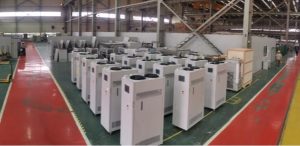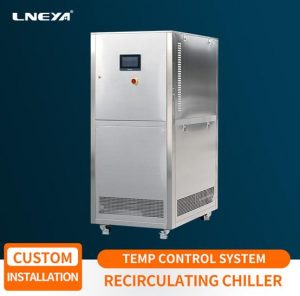Em que instrumentos pode ser utilizado o refrigerador de recirculação para laboratório LNEYA?
Laboratory recirculating chillers have a wide range of applications in scientific research and industrial production, providing precise temperature control for various experiments and instruments.
The following are some common scenarios and supporting instruments for chillers in laboratories:
- Spectroscopy equipment: Spectrometers (such as UV visible spectrometers, infrared spectrometers, Raman spectrometers, fluorescence spectrometers, etc.) may require the light source, detector, and sample cell to operate at a constant low temperature to ensure measurement accuracy during optical measurements.
2. Mass spectrometer: Mass spectrometry analysis instruments, including liquid chromatography-mass spectrometry (LC-MS), gas chromatography-mass spectrometry (GC-MS), etc., require cooling in key areas such as ion sources and detectors to reduce noise, improve resolution and stability.
3. Electron microscopy (SEM, TEM): Some electron microscopes require cooling of the electron gun and sample chamber, especially in high-resolution imaging and diffraction modes, to reduce thermal noise and prevent sample blurring due to thermal drift.
4. Laser: Different types of lasers, especially solid-state and semiconductor lasers, require cooling of their laser media and heat dissipation components to prevent overheating, ensure stable laser output, and extend laser lifespan.
5. Vacuum system: The heat generated by vacuum equipment such as molecular pumps and diffusion pumps during operation needs to be cooled by a chiller.
6. Common laboratory instruments: rotary evaporator, distillation device, electrophoresis instrument, fermentation tank, condenser, reaction kettle, etc. The heat generated by these equipment during operation needs to be effectively cooled by a chiller to control reaction conditions and ensure the accuracy of experimental results.
7. Materials Science and Engineering: Semiconductor lasers, vacuum coating machines, nanomaterial synthesis equipment, etc. These high-tech equipment need to maintain a constant low temperature environment during the preparation process.
8. Data collection and analysis: Laboratory data collection systems, electronic devices, and other precision instruments that require temperature control to ensure stable performance.
In summary, laboratory recirculating chillers play an important role in various experiments involving temperature control and high-end precision instruments, ensuring precise control of the experimental process and long-term stable operation of the instruments.
Request a quote
Oferecer 7 * 24 consultas gratuitas e soluções abrangentes
Recomendações relacionadas
-
Automotive new energy battery / motor thermal management performance test
9341. Thermal management physical architecture analysis New energy vehicle thermal management systems typically include engine cooling systems, power device cooling systems for motors, motor controllers, battery pack cooling/heating systems, passenge...
Ver pormenores -
Qual é o refrigerante do refrigerador de recirculação
1038Different industries have differentrequirements for the refrigeration temperature of the recirculation chiller, sothe selected refrigerant is also different. When choosing a recirculationchiller, it is also necessary to have a clear understandi...
Ver pormenores -
Immersion phase change liquid cooling system
1116What is immersion phase change liquid cooling system?
Ver pormenores -
Design of chip test circuit for fluid temperature control device
1222With the continuous development of the domestic chip industry, LNEYA fluid temperature control devices continue to be applied. To this end, the circuit design for the fluid temperature control device chip test, the fluid temperature control device...
Ver pormenores
 LNEYA Refrigeradores industriais Fabricante Fornecedor
LNEYA Refrigeradores industriais Fabricante Fornecedor














Submeter para consulta
Responder-lhe-emos no prazo de 24 horas